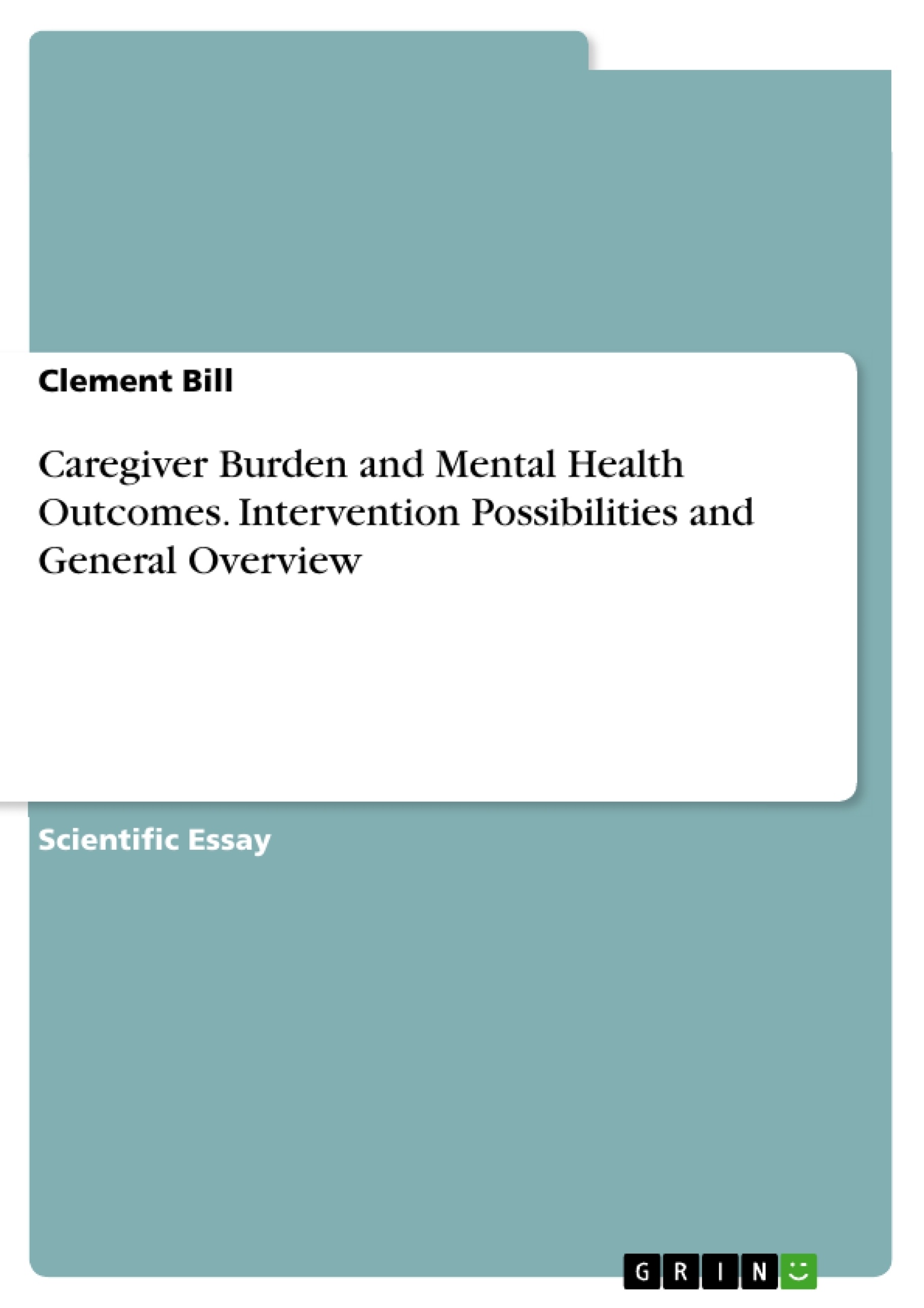Caregiver burden is regularly used in nursing literature. However, it has not been yet clearly defined because there are various opinions regarding the concept. This document provides clarity surrounding the concept of caregiver burden and outcomes associated with it.
Caregiver burnout can harm the health of the caregiver and has been linked to increased stress, depression, and decline in physical health. Caregiver burnout is correlated with the profession of nursing and common in caregivers caring for chronically ill family members. Knowing and identifying the signs and symptoms associated with caregiver burden can decrease adverse events for both the caregiver and the patient. Caregiver burnout can have physical and psychological effects on the caregiver. Appropriate interventions are needed to alleviate the stress and promote a better quality of life for themselves and their patient. The author did his research from the following databases; CINAHL, MEDLINE, Health Source Nursing, COCHRANE, and Academic Search Complete (ASC) of EBSCO. The paper adopted the framework by Walker and Avant. The antecedents, attributes, consequences, and uses of the concept were identified.
The three attributes of caregiver burden were identified as multifaceted strain, self-perception, and over time. The antecedents included lack of social activities, insufficient financial resources, and multiple responsibility conflict. The consequences of caregiver burden resulted in negative change which includes; a decrease in quality of life, decreased care provision, physical and psychological health deterioration. Generations and Gender Programme (GGP) data from France, Georgia, Bulgaria, Russia, and Romania were researched, and depression score is the outcome variable. A definition of caregiver burden was developed. Tools to measure caregiver burden were identified. The findings from this research can be used in nursing practice, nursing education, research, and administration. Providing parent care is stressful, and these stresses are associated with adverse mental health outcomes.
Inhaltsverzeichnis (Table of Contents)
- ABSTRACT.
- INTRODUCTION.
- LITERATURE REVIEW
- RESULTS AND DISCUSSION..
- FUTURE IMPLICATIONS IN NURSING RESEARCH.
- CONCLUSION.
- REFERENCES
- APPENDIX.
Zielsetzung und Themenschwerpunkte (Objectives and Key Themes)
This document aims to clarify the concept of caregiver burden and its associated mental health outcomes. The research investigates the various perspectives surrounding caregiver burden and explores the consequences it has on both the caregiver and the patient. The study utilizes Walker and Avant's framework to identify the attributes, antecedents, and consequences of caregiver burden. The aim is to provide a comprehensive understanding of the concept and its implications in nursing practice, education, research, and administration.
- Defining and understanding caregiver burden.
- Exploring the consequences of caregiver burden on mental health.
- Identifying factors that contribute to caregiver burden.
- Examining the role of caregiver burden in nursing practice and research.
- Highlighting the importance of addressing caregiver burden in healthcare settings.
Zusammenfassung der Kapitel (Chapter Summaries)
- ABSTRACT: This chapter introduces the research problem of caregiver burnout and its connection to increased stress, depression, and physical health deterioration. The document aims to clarify the concept of caregiver burden and its impact on both the caregiver and the patient. It also presents the hypothesis that caregiver burnout is associated with decreased quality of life and adverse outcomes for both parties.
- INTRODUCTION: This chapter delves into the concept of caregiver burnout, its causes, and its potential impact on the caregiver's physical and mental health. The importance of recognizing the symptoms of burnout and seeking help when needed is emphasized. The chapter also discusses the role of family members, particularly in countries with strong social care sectors, in providing care to the elderly.
- LITERATURE REVIEW: This chapter outlines the research methodology employed in the study, focusing on the use of Walker and Avant's framework for conceptual analysis. The framework provides a step-by-step approach to understanding the concept of caregiver burden, including identifying its attributes, antecedents, consequences, and uses.
Schlüsselwörter (Keywords)
The key terms and focus topics explored in this text include caregiver burden, quality of life, mental health, caregivers, home nursing, cost of illness, informal care, and parent care. These keywords encapsulate the core concepts and research areas investigated in the document, highlighting the interrelationship between caregiver burden, mental health outcomes, and the provision of care in various healthcare settings.
Frequently Asked Questions
How is 'caregiver burden' defined in this research?
Caregiver burden is defined as a multifaceted strain experienced over time, characterized by the caregiver's self-perception of stress and responsibility.
What are the primary consequences of caregiver burnout?
Consequences include a decrease in quality of life, deterioration of physical and psychological health (such as depression), and a decline in the quality of care provided.
Which countries were included in the GGP data research?
The study analyzed data from France, Georgia, Bulgaria, Russia, and Romania, with a focus on depression scores as an outcome variable.
What factors contribute to an increase in caregiver burden?
Key antecedents include a lack of social activities, insufficient financial resources, and conflicts arising from multiple responsibilities.
How can identifying symptoms of burden help in nursing?
Early identification can decrease adverse events for both the patient and the caregiver and allows for interventions that promote a better quality of life.
- Citar trabajo
- Clement Bill (Autor), 2021, Caregiver Burden and Mental Health Outcomes. Intervention Possibilities and General Overview, Múnich, GRIN Verlag, https://www.grin.com/document/1045594



